- Home
- David Leavitt
The Lost Language of Cranes: A Novel Page 7
The Lost Language of Cranes: A Novel Read online
Page 7
Sam was enraged on the rides home from his parents' house. "Why won't they do something?" he said to Margaret. "They could retire to Florida. I'd give them the money." But they wouldn't take Sam's money because of pride. Jerene had trouble figuring out what pride was. In her schoolbooks, the proud boy was haughty and looked down on his friends, but that sounded more like her parents than her grandparents. To Margaret, pride meant you didn't take things that were offered, pride meant you suffered stupidly. She was not above admitting the many times she had swallowed her own pride, and done better for it. Jerene leaned back in her seat, wondering. She knew her father's childhood as mythology—scrubby lots to play in, not enough heat. He had no toys. The streets were full of toughs. "Just be glad you've got all this, my little honeybee," he'd say to her when she was little, pushing her in the backyard swing, and she would look around herself at the twilit green trees, the leaves on the ground, the little gazebo near the gardener's shed. None of it was hers except by refugee's luck. And then an extraordinary thing happened: Her father, pushing her on the swing, suddenly grasped the metal chains, pulled her back, held her suspended in mid-air, so that she thought she could see the world's roundness below her, and buried his head in her back to weep.
She knew certain facts. He had been, at the age of seventeen, the first black boy chosen Boy of the Year by the Bensonhurst Brooklyn Optimists' Club. He had been the first black editor of the paper at his college, and of the Law Review at his law school; the first black lawyer at one firm, the first black partner at another. All through his twenties he stood on podiums, and his hand was shaken and his back was patted. Jerene came along, afterwards many large men smelling like gingerbread lifted her into the air. She'd stand with her mother in the ladies' room, and the wives would politely pass makeup tips to Margaret, then suddenly grow embarrassed and say, "Oh—I guess you people have your own brands, don't you?" Margaret always smiled.
Sometimes they would find themselves alone in the car with the statuettes and prizes, driving through dark suburban streets that became increasingly unfamiliar. From the back seat Jerene would stare at the backs of her parents' necks—her father's carefully shaved and trimmed, her mother's shiny and bare in the moonlight, caressed by the clasp of a necklace, a few pearls. They would get lost. Sam would pull the car over, and his neck would be soaked with sweat. "Look, Sam, we're in Noroton Heights," Margaret would say. "I know exactly where we are. There's that mall where I went with Jerene the other day." And slowly, exactingly, she would direct him home.
He was a Nixon delegate in 1968. Jerene was eleven and voted for Humphrey. She prayed that her Humphrey-supporting best friend, Jessica Hudson, and Jessica's Humphrey-supporting parents, wouldn't say anything.
Still, when the convention was on television, she watched with her mother and was thrilled to see Sam's face suddenly filling up the screen. "We're talking to Mr. Samuel I. Parks," the reporter said, "an attorney from Connecticut, and one of the few black delegates here at the convention. Mr. Parks, as a Negro, how do you feel supporting Mr. Nixon in the face of your race's overwhelming support of the Democrats?"
"I fully believe that Richard Nixon is what our country and our economy needs now," Sam said. He was sweating and looked rather uncomfortable, but his voice was sure.
"Mom," Jerene said.
"Hush up!" Margaret said. "How many times in your life are you gonna get to see your father on television?"
And indeed, Jerene could not help feeling a secret pride, for he looked so handsome with the microphone in front of his mouth.
She never talked about it with Jessica.
She grew up, grew taller and kept growing. By the time she was in junior high school she was already five foot eleven and the star of the basketball team. That year her school won every game, and Jerene was named Most Valuable Player.
She brought the trophy home and showed it to her mother. Margaret was cleaning the big house, which over the years had acquired an apparently insurmountable coat of dust. "Why do you have to play that game?" she asked when Jerene showed her the trophy. "It's so—unladylike." She did not approve of Jerene playing basketball; she had said it from the start.
Behind her, Margaret dragged the vacuum cleaner like an unwilling beast of burden. "Why?" Jerene repeated. "Because blacks play basketball? You're worried someone might confuse me for one of them?"
Her mother only shrugged. "That uniform," she said. "Really, Jerene, couldn't they give you something a little more feminine? And why do you always wear those ugly pants, when I've bought you so many pretty dresses?"
"Pretty dresses look stupid on me," she said.
"You never try," Margaret said. "You don't give yourself a chance to be pretty. Ah, there you are. Now I'm gonna get you." She was talking to the dust. She stuck the special vacuum-nozzle behind an antique mirrored table, and Jerene listened to the peculiar, pleasant sucking sound it made.
She slept over at Jessica's all the time now. Jessica's mother, who was a magazine editor, was mild and abstracted and thought nothing of it. Jessica herself was Jerene's best friend, robust, big-breasted, a discus thrower, and had taught Jerene how to make love with her tongue and fingers and hips. They did this most nights when Jerene stayed over now but were only just beginning to gain a consciousness of what it meant—that they were lesbians—a realization to which Jerene's first reaction was, "Of course. That's how it is. I've known it all along." Of course there was more; she realized, distantly, that this kind of love couldn't be easy, that she must suffer more than she had. The word "abomination" kept creeping through her mind—from a church sermon, she supposed, or perhaps from under her mother's breath when they heard about Billie Jean King and her secretary on the radio. Were they lovers, girlfriends, in love? Certainly they had never spoken about the quiet passion that took up most of their nights together. And Jessica was too busy thinking about Harvard in the fall to worry about such things.
Jerene, less ambitious and yearning for the city, went to N.Y.U. Separated, finally, from her parents, she started to attend meetings of the Afro-American Women's Caucus, the Lesbian Caucus, the Radical Women of Color Caucus. In imitation of Cornelia Patterson, a lesbian leader whose stage presence and nearly bald skull impressed her greatly, she shaved off most of her hair one day. "What have you done to yourself?" her mother shouted when she walked in the door at Christmas break. "My God, you've maimed yourself." She and Sam were so appalled they threatened to refuse to pay her tuition for the next term, and she only dissuaded them by promising to grow her hair back. At first that didn't satisfy them, until they realized it was the only choice they had. They relented.
Over dinner she told them about her new politics, and her involvement in the Black Women's Movement. Margaret, spearing small curlicues of potato with her fork, looked at Jerene warily. "And do you really think," her father asked, staring her down across the table, "that such isolationism will do anyone any good?" It was an old argument, one they'd had many times before. "First the black movement," Sam muttered, gazing disconsolately into his plate. "Now the black women's movement. I know it's not a popular opinion, Jerene, but I just don't see the point of all this separatism."
Then he told her again that you had to work through the system to change it from inside, etc. "We're all human," he concluded triumphantly. Margaret looked on in approval. Jerene recognized that tactic—wrapping his snobbery and defeat in the guise of Christian good will—and considered it beneath responding to. She went back to her dinner, and the next morning found a mysterious check for fifty dollars by her bedside table. "For a nice wig" was written on the line where it said "Memo."
Six months later she made a special trip home to tell them that she was a lesbian. For years afterwards she would wonder why she did it—whether it was, as she told herself then, an act of political integrity, motivated by her real need to be honest with her parents; or whether it was revenge she was really after—revenge, and liberation. She had long since convinced herself that her lesbia
nism was a neutral thing, neither good nor bad in itself. But she also knew that this neutral fact of her life, when presented to them, would be as potent as a machete brandished in front of their faces, and would cut as deep. She had made many preparations, consulted many books. "Afternoon is best," Cornelia Patterson had counseled her, and so she marshaled her parents into the living room in the afternoon to give the news. Her father looked out the window at the oleanders in the garden while she spoke; her mother sat on the sofa and wept. "Are you finished?" Sam asked her when she had been silent for a few seconds.
"Yes, I'm finished."
"Then I will say to you this," he said, turning around. "I will say I would rather you'd told me you were dying of terminal cancer." His eyes did not waver from the flowers.
"Dad," she said. "How can you say that? How can you just stand there and say that to me?"
"You've been a disappointment all along to us, trouble every step of the way. And now to come home with this—this filth, this abomination. What do you expect me to do, just sit back and smile?"
"It's like a death," Margaret murmured softly from the sofa, between sobs. "As if she's died."
"Mom!" Jerene said. "Dad! I'm still me. I'm still your daughter, your Jerene. Please! I'm trying to be honest with you, to tell you the truth for once."
Her father turned from her, looked once again out the window. "You're not my daughter," he said. "Thank God for that, if nothing else. You're not my daughter."
Thus he pulled the machete from where it lay implanted in his heart, turned it around, and sliced her clean off.
Without saying another word to them, she left. She walked the two miles to the suburban train station, waited an hour on the empty platform, on a bench, her knees gathered against her chest, rocking. Back in the city, she wrote them a check for the sum total of all the money they had ever given her. It was something like three hundred thousand dollars. They never tried to deposit it, of course, but she burned the checkbook anyway. Years later, it pleased her to think that the money she actually had in that account—a little over five thousand dollars—might still be sitting there, accruing interest, untouchable.
Once, about a year later, at Eliot's insistence, she called them on her mother's birthday. Margaret answered. "Mom?" she said. "Mom, it's me, Jerene."
Margaret said nothing.
"I'm happy to hear your voice," Jerene said. "It's been so long. I've missed you—"
Still, silence. "Jerene?" Margaret said. "I don't know anyone named Jerene. I don't know any Jerene. You must have the wrong number."
Then she hung up.
A. few years later, walking down Fifth Avenue, Jerene saw her. Margaret's hair was all gray now, and she had put on weight. She was peering at some shirts in the window of Bendel's. For a moment, it was as if the years of silence hadn't passed at all. How could they have, after all? It was ridiculous, embarrassing three intelligent people, and all too stubborn to make a gesture. Her mother stood there, completely unaware of Jerene's presence, staring at the shirts, and then she pulled a tissue from her big pocketbook and blew her nose. It was the same red patent leather pocketbook she had always had, and seeing it, Jerene was moved to tears. She wanted to run up to her mother, to embrace her and refuse to let her go until she cried, until she gave in, until she admitted Jerene was there, admitted she had a daughter. Indeed, standing in the middle of the intersection, she was held back by nothing but fear. Then the light changed, and a crowd swept across the avenue, over the sidewalk. By the time it had passed, Margaret had moved on.
"HOW OLD were you when Derek and Geoffrey found out that you were gay?" Philip asked Eliot. It was four in the morning, and they were lying on the blue futon, nowhere near sleep.
"Oh, let's see," Eliot said, stretching his arms out behind his head. "I guess it must have been—but no." He smiled. "The thing is, with Derek and Geoffrey, I'd only have had to come out if I was straight. Come to think of it, I don't think I ever actually did come out to them. I just remember, when I was twelve or so, Derek walking into my room and finding me making out with Timmy Musseo. And he just said excuse me and closed the door."
Philip's jaw dropped. "You were making out with boys when you were twelve?"
"Eleven," Eliot said. "Geoffrey and Derek only found out when I was twelve."
"Then how old were you when you first had sex?"
Eliot shrugged. "I'm not sure," he said. "How do you define sex? If orgasm is the criterion, twelve. If anal or oral penetration is necessary, fifteen."
"And was that with Timmy Musseo?"
"No, no," Eliot said. "Timmy Musseo had a girlfriend by that time. My first experience was with a much older man, a friend of Derek's. He and Geoffrey never found out about it. Probably they still don't know."
"How old is older?"
"Oh, let's see," Eliot said. "When I was fifteen, he must have been twenty-nine, thirty. My age now. He came and stayed with me at the house whenever Derek and Geoffrey went away."
"Did he seduce you?"
"I seduced him," Eliot said, and laughed. "Oh, he wanted to for as long as I did. But I think he was afraid Derek would send him up for statutory rape or something. I was irresistible at fifteen. I kept asking him to give me massages, playing the little nubile waif. And finally—well, he couldn't hold back anymore." He sighed. "It was a wild night. We did everything."
Philip's mouth was dry. "When I was that age," he said, "—well, I never would have dreamed, no matter how much I might have wanted to—" But he knew enough about Eliot's childhood in that rambling brownstone on West Thirteenth Street to know that it was about as different from his own as you could get. Eliot had been raised not by normal parents, after all, but by two men, by Derek Moulthorp, the famous writer, and his lover, Geoffrey Bacon. When Philip imagined him as a child, he was lying in a brocaded canopied bed, having stories read to him by Colleen Dewhurst, but now the fantasy changed, and it was a young man with long brown hair, dressed in an unbuttoned tuxedo shirt, who sat leaning over Eliot in his bed, running his hand languidly through Eliot's hair.
"I just can't imagine," Philip said, "having that kind of self-knowledge, that kind of. . . wherewithal, at fifteen. At fifteen I was just discovering pornography. I didn't have sex until college. "
"Everyone's different," Eliot said, "depending on their background." He was staring up at the ceiling, onto which he had pasted glowing constellations from a kit. At night, sometimes, he liked to name them: dog, dipper, hunter.
"One more question," Philip said. "If you don't mind."
"Not at all," said Eliot.
"How old were you when you had your first real lover?"
"Seventeen," Eliot said. "At Jasper Ridge. My roommate, Ben Hartley, and I were secret lovers for an entire year. He was wonderful. A hockey player. He must have been six foot five. We spent a semester together in Florence, and when we'd walk by the fake David in the Piazza della Signoria, everyone would stare at Ben instead. He was the most amazing lover I ever had. But it was one of those secret things, so it didn't seem real."
"Was it always secret?"
"Unfortunately not," Eliot said. "One of the house monitors happened upon us one afternoon in the shower. Now this was Jasper Ridge, mind you, the hippie school to end all hippie schools, but homosexuality was still not exactly a thriving thing there. We had to talk to the Jaspers themselves, and Mr. Jasper, who was this old ex-Beat with a lot of money, he kept saying, 'Wow, that's really great. I can really relate to that.' He wanted Ben and me to go before the whole school and announce ourselves, because he thought it would be very consciousness-raising for the other kids." Eliot laughed. "Thank God we talked him out of it. Most of those kids were little thugs. They'd have killed us."
"Whatever happened to Ben Hartley?" Philip asked.
"He went to Colgate. We lost touch. Last I heard he was out in California, working as a carpenter or something."
Philip was silent. "My first love affair—if you can call it that—wasn't nea
rly so much fun," he said.
"You mean Dmitri?"
"Have I mentioned Dmitri?"
"Only in passing."
"Dmitri was a physics major," Philip said. "He was very dark, and he had these mad-scientist eyes that would kind of zero in on you and just not turn away. It was hard to resist. My first lover." He laughed. "You know," he said, "he hated the word 'lovers.' He preferred to say we were 'friends who had sex,' and of course only between us, because he was insistent that none of his friends or, God forbid, his professors ever find out he was gay. He made it clear from day one that if I mentioned our relationship to anyone, even to Sally, he wouldn't speak to me again. But even though he was so secretive, he was very promiscuous. He used to claim to be able to identify how much hair a man had on his ass by how much he had on his wrists. That kind of thing was very important to him."
"How long were you together?" Eliot asked.
"Six months, I guess, give or take a few weeks. The last semester of college. But he never loved me. He had an older brother, Alex, who was also gay, and also a physicist, and I think if he loved anyone it was him. Not sexually, of course, just in a sort of worshipful way." He smiled. "I remember at graduation I finally met Alex. He looked just like Dmitri, except he worked out, so he had muscles, and his boyfriend was a male model. They were there with their parents—the father was some sort of industrialist, and their mother was this very thin spacey woman from Texas—and also their grandmother. She was something. Maybe four foot eleven, and built like a tank. She had this little camera, and she was so proud she kept insisting on taking pictures of Dmitri—first alone, and then with Alex, and then with both of us. And standing there, it felt so strange to me, to think that this old woman worshipped them so much, and didn't have the slightest inkling, not the slightest idea about them. Of course, it must have been very hard, both of them being gay after all, and the only sons. I guess they really believed they'd be disowned if they told their parents, and probably they were right. But what amazed me was, it was as if they couldn't care less. They just made joke after joke about it. In fact, I thought I'd feel very nervous standing between them like that, I thought I'd be afraid every second the parents would see something. But somehow I felt safe, safer than I'd felt all that year. I think Dmitri and Alex protected each other, and it was as if their protection covered me as well—does that make sense?"

 Shelter in Place
Shelter in Place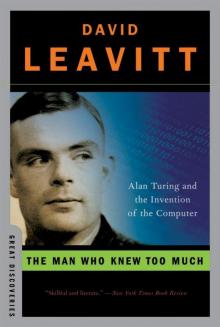 The Man Who Knew Too Much: Alan Turing and the Invention of the Computer (Great Discoveries)
The Man Who Knew Too Much: Alan Turing and the Invention of the Computer (Great Discoveries)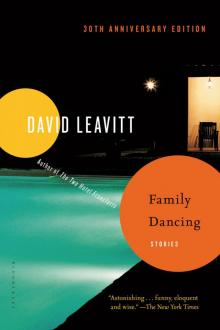 Family Dancing
Family Dancing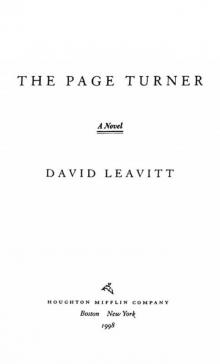 Page Turner Pa
Page Turner Pa The Lost Language of Cranes: A Novel
The Lost Language of Cranes: A Novel The Body of Jonah Boyd
The Body of Jonah Boyd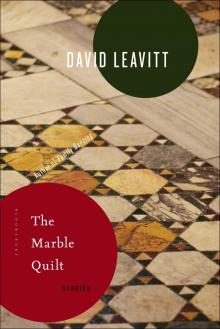 The Marble Quilt
The Marble Quilt In Maremma
In Maremma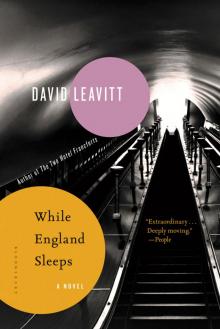 While England Sleeps
While England Sleeps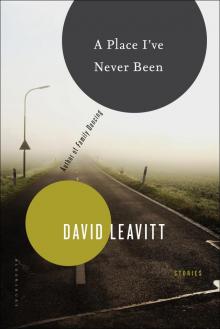 A Place I've Never Been
A Place I've Never Been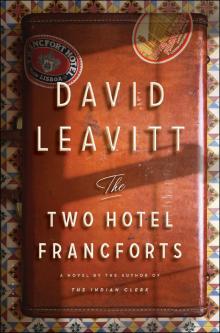 The Two Hotel Francforts
The Two Hotel Francforts The Indian Clerk
The Indian Clerk Florence
Florence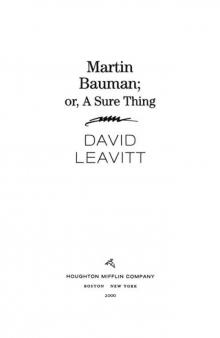 Martin Bauman
Martin Bauman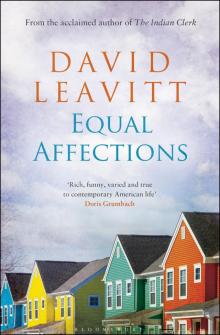 Equal Affections
Equal Affections The Lost Language of Cranes
The Lost Language of Cranes Arkansas
Arkansas